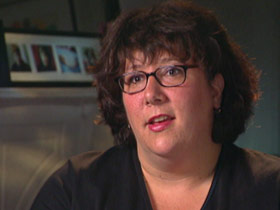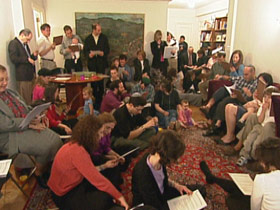In This Episode << SLIDE LEFT TO SEE ADDITIONAL SEGMENTS
Simchat Bat
BOB ABERNETHY: While a Bris, or circumcision ritual, has been the traditional way for Jews to welcome baby boys into the covenant, many families are now creating rituals to welcome their baby daughters. This practice, most commonly called a Simchat Bat, began about 25 years ago and has gained popularity across all branches of Judaism. Unlike the Bris, which must be performed eight days after a boy’s birth, a Simchat Bat can take place anytime before a girl’s first birthday. We spoke to Debra Nussbaum Cohen, author of a book on Simchat Bat rituals, and attended Sarah Rose Greenberg’s ceremony in New York City.

DEBRA NUSSBAUM COHEN (Author): “Simchat Bat” means celebration of a daughter. It’s the most general term; it’s accepted in all parts of the community: Orthodox, Conservative, Reform, etc.
A Simchat Bat is usually done at home. There’s no one formula, one ritual, one set, codified ritual for Simchat Bat. It’s completely flexible, almost completely flexible, and very individual to the family, very unique to the family that’s composing it, and welcoming their individual daughter.
And I think most importantly, it’s usually led by the parents, rather than by a rabbi.
All families who do a Simchat Bat for their daughter, talk about the names. And what they mean. And a beautiful way to do that is to have relatives who are most closely related to the people for whom the girl is named, talk about these people who they knew. And of course in a large part of the Jewish community, it’s the custom to name a child after deceased relatives whose personality qualities you want … you hope the child will grow to have herself.

Parents can offer their guests or a few honored guests to offer their good wishes to the baby, and they might say something very personal, or they may read some piece of poetry or prose or Jewish text that’s very meaningful to them.
Then things are wrapped up with a song and no Jewish ritual is really complete without a festive Jewish meal afterward.
This is not a woman’s only ritual by any means. It’s just a co-equal opportunity for the first time really, to welcome girls as we do boys, and for mothers to stand up with the fathers to welcome their children.
It’s significant to parents because it’s an expression of their joy, and at having a daughter and a new member of their family, and it’s a way for them to express their commitment to raising her in a Jewishly engaged way.
And it’s significant for the girl, because it’s starting her out in a way that says, “We take you seriously as a member of the Jewish people.”







